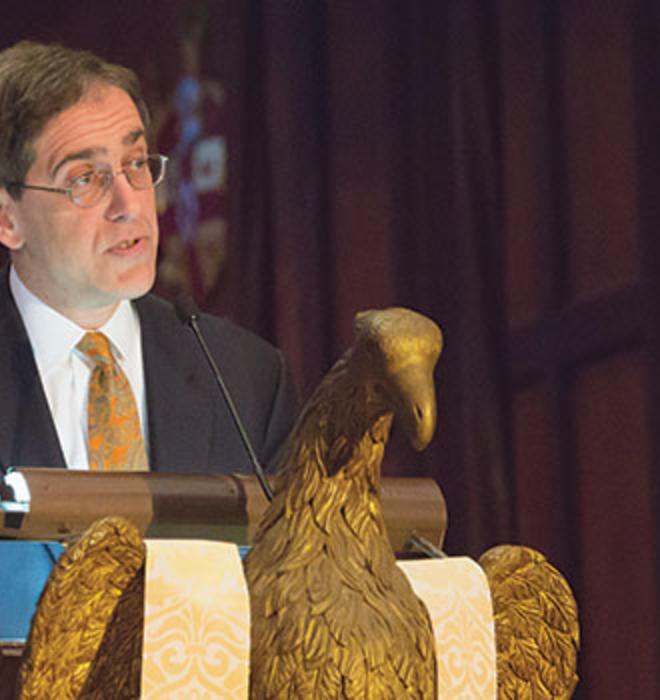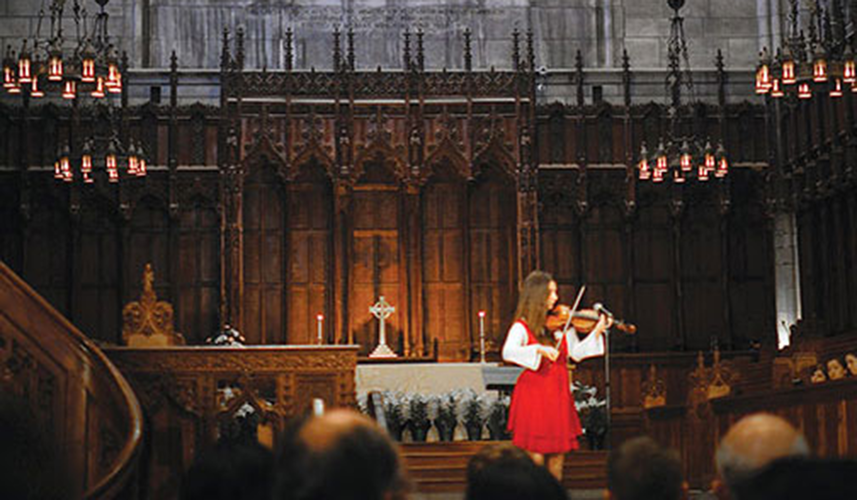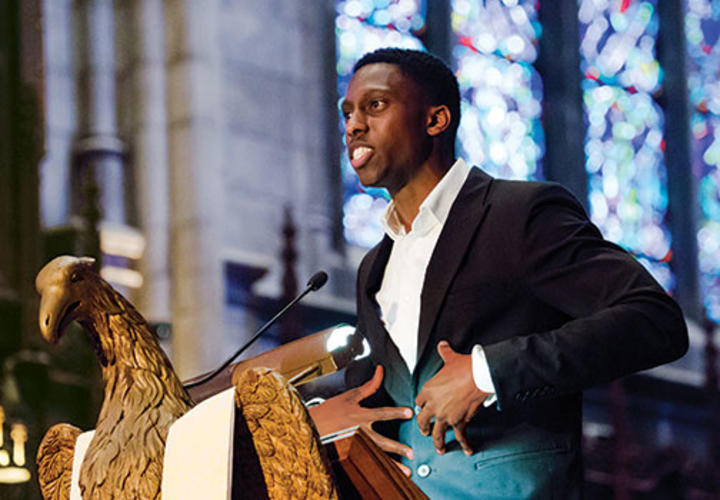
PAW’s May 13 issue included coverage of a controversy over questions of racism and free expression stemming from two campus performances and comments posted on the social-media app Yik Yak. In an effort to spark dialogue and bring the Princeton community together, President Eisgruber ’83 convened a gathering in the Chapel April 12 at which he and eight others offered reflections. PAW requested permission from all speakers to publish their statements; here are the remarks of six, edited slightly for publication.
President Christopher Eisgruber ’83
Thank you for coming to this gathering. ... I hope this gathering will give us a chance to reflect on problems that confront us, on differences that divide us, and on values that we share. I have myself come mainly to listen, to learn, and to reflect, so I am going to try to be brief in these welcoming remarks. I do, however, want to say some things about the occasion that brings us together.
As all of you know, this has been a difficult week for our campus. Eruptions of hostile and thoughtless comments on Yik Yak have left many of our black students, and our LGBTQ students, feeling anguished, angry, and unwelcomed on this campus.
These hateful comments have no place at Princeton. The anonymous cowards who post these messages debase all of us with their ignorance and their contempt.
Of course, because they are anonymous, we cannot know who they are, or how numerous they are. For those of us in the majority culture, it is tempting to dismiss these cowards as few in number, or unimportant. “Not really us,” in other words.
But that overlooks a larger challenge, a challenge that those of us in the majority culture need to own and address. The taunts and insults of the last week have been hurtful not only because of what they have said, but because of the other experiences that minority students have had on this campus. On our campus and in our society, members of minority groups too often find themselves hurt, excluded, or diminished by stereotypes, by ignorance, by thoughtlessness, and by hostility.
During the past week, I have talked to many people about the events that have disturbed this campus. I have been struck by many observations in the course of those conversations. I have been impressed, for example, by how much people on this campus love this University, and how much they want it to be a better and welcoming place. But I have also been startled by the tremendous gap in perspectives — how differently people see things.
Those of us in the majority culture often do not see the thoughtlessness or the insults borne by others. And we do not appreciate the feelings of exclusion that result.
We have a responsibility to change that. We have a responsibility to expand our perspectives and improve our campus climate, so that minority members of this community feel fully welcome and so that the anonymous cowards find no fertile ground here for their hatred or their ignorance.
I hope that today’s gathering can contribute to the change that we need, and I look forward to hearing from the speakers who follow.
Isaac Serwanga ’13, athletics administrator and founder of the Profound Ivy mentorship program
I want to use this opportunity to offer my perspective as an alumnus. Though I was asked to prepare a speech, I instead wrote an action plan, something that I believe would be of greater value than my own personal rhetoric. The plan isn’t complicated, but I believe it can be an effective tool as we desperately look for ways to heal our campus and build our community.
As a young black male and varsity athlete here at Princeton, I often found myself believing that Princeton could do more for me and those who fit the same mold. The transition into the Orange Bubble wasn’t the smoothest for me, and I found that the black males who were teammates of mine felt the same way. From the football locker room to the track-and-field locker room to the basketball locker room, I found myself hearing the same complaints from the black male student-athlete population. I called it an “I wish” list: “I wish Princeton had this! I wish Princeton told me that!” I would go back to my room in Spelman Hall and complain to roommates, and when they stopped listening I complained to myself. It wasn’t until my senior year when the light bulb went on, and I realized that I could be an agent of change.
I realized that for three years, I had been looking to everyone but myself to help make the community in which I belonged more suitable for me. There’s a great lesson to learn from this that applies to our current situation: We must realize that the onus does not fall on any one individual, but on each and every one of us equally. I hope today that we do not see these issues as any particular group’s, but rather as issues that face us as the Princeton community.
In my senior year, I came up with the idea of Profound Ivy, which would become Princeton University’s first mentorship program for black male student-athletes. It was established to provide these students with the resources, skills, and guidance necessary to achieve success both as current student-athletes and as future working professionals.
I worked side by side with our administration to develop the program, and the Profound Ivy group met for the first time in January, during my first year on the athletics-department staff. The ultimate goal was to enhance the Princeton experience for these young men, and in doing so strengthen the entire Princeton community. We cannot help move along the community if we do not first enhance ourselves.
Using a three-pillar approach to strengthen academic efficiency, career planning, and leadership development, Profound Ivy provides the necessary support and also demands the necessary commitment for the athletes to achieve profound success.
The following formula is one that I strictly followed as I asked myself the question, “How do I go about making a change?” I hope it can serve as a guideline that can be directly applied to our current situation and ultimately help us progress to achieve the results we wish to see.
First, constructive criticism. This is how any person or organization improves. Never resting on its laurels, an institution such as Princeton University should feel privileged to retain brave students, faculty, and staff who are willing to praise all that is right and concurrently state what is missing from or wrong with the status quo. Individuals and groups should feel comfortable bringing these issues to the forefront and having their voices heard openly and respectfully.
Next, positive engagement: While these criticisms may often create emotionally charged environments, I believe it is essential for students, in this case, to keep the engagement positive. This is not meant to pacify; rather, it is meant to keep the intent of the conversation clear. The intent of positive engagement is to do the groundwork to lead us to a clear result. Negative engagements undoubtedly will lead to defensive discussions, and the intended result often will get lost in the discussion. This leads us to our next and final pillar, mindful action.
At every step, it is essential for all involved to use empathy and take mindful action. The key here is “mindful”; that is to say, “If I take this action, how does it affect all those involved? How does this action enhance the entire community? If someone will be negatively impacted, who will it be — and why?” It is important to strongly consider asking these questions as we seek to create change to enhance our entire Princeton community.
Serwanga gave his remarks from notes; this has been re-created.
William Gleason, professor of English
When President Eisgruber asked me if I would be willing to take part in today’s event I was hesitant, but I said “yes.”
I was hesitant, in part, because I wasn’t sure I was ready to speak. Frankly, I didn’t know what gave me the standing to speak. And while I appreciated the importance of the president’s call for this community to come together in a time of such division, I worried that today’s event could be perceived as patronizing, even dismissive, of the anger and emotion that has been churning in recent weeks.
I said “yes,” on the other hand, because for the last 22 years Princeton has been my intellectual home, and I care deeply about what happens on this campus. I also believe that everything that happens on this campus touches every one of us — that we are all involved in and affected by the events that take place, and that no one can turn away and say, “This doesn’t involve me.”
I also said “yes” because, while I told the president that I was still working through my feelings on these debates, there are some things that I feel are very clear. For example, I think there is an important difference between using humor as a form of satire — in which the purpose is to critique a particular point of view in order to effect social or political change — and drawing humor out of a cultural impersonation in order to entertain. Humor can be a powerful social weapon, and, as we have seen, it can also be a divisive and deeply humiliating gesture.
I also think it’s incumbent upon us to understand more clearly the histories of the cultural forms that we use. That’s what can make — indeed should make — the educational setting on a campus like this an ideal one for learning from and discussing such forms. The long history of minstrelsy in this country, to take one example, seems entirely relevant to at least one part of the discussion that’s taking place. There is much, I think, that informed historical knowledge about the work of culture can bring to our own understandings today.
What we also need — perhaps above all — is a more informed knowledge of each other. One reason I am drawn to the study of literature is that it can provide a powerful means of learning what it’s like to be someone else, to be caught up in someone else’s life, and to see the world, if only for a moment, through their eyes. That kind of empathy — thoughtful, rigorous empathy — strikes me as particularly important in this moment.
I said earlier that I agreed to speak in part because I consider Princeton my intellectual home. But I know that for those of you who live on campus, it is more than that. It is, while you are here, your actual home. I hope we can help make it one in which you all feel, every day, that you belong.
Carolyn Rouse, professor of anthropology
I would like you to turn to someone near you — someone whom you do not know well. Look them in the eye and repeat the following paraphrased comments posted on anonymous social media: “African cultures have had no impact on the modern world.” Now turn to another person you do not know well. Look them in the eye and repeat: “You are a racist.”
I hope that wasn’t easy.
The response some viewers had to the Urban Congo performance does not represent a crisis. It is OK that people were upset. In any democracy, the struggle to balance the rights and duties of citizens, positive and negative liberties, is an ongoing process. We draw lines in the sand marking when someone’s freedom negatively impacts another. These boundaries are a product of history, culture, and changing societal values.
The people who were offended by the Urban Congo performance are people who believe that the performance crossed a line. My sense from these students is that they are tired of the idea that in America, generations of people, deemed educated, can have effectively no knowledge of Native American or African cultures and history.
I have spoken with one of the performers, and it is clear to me that he had no intention to offend. And yet, it also seems equally clear that he had not thought through how the performance would be interpreted by others. As one small example, two New Yorkers I spoke with thought Urban Congo was a reference to the ghetto — clearly not the intended message. And what Urban Congo did communicate was that only some people matter — an inherited belief that only some people’s histories and identities matter. But ignorance, as one student noted, is no longer an excuse. While the students in Urban Congo had the right to their performance, they also had a responsibility to understand the implications of their choices.
The reason I asked you to look each other in the eye and state unsubstantiated opinions is because I want to remind us that negotiations over decency, negative and positive liberties, require showing up — being present with those impacted by the choices we make. Diversity is going to have uncomfortable moments that cause us to redraw the lines in the sand. Performers — good performers — often take risks, skirt the edges of taboos, and as a result get an audience to think, question, and grow. They help us to redraw those lines together, not as enemies. Good people disagree. We think, we question, and we grow.
Lina Saud ’15
As a student at Princeton, I can attest to a level of stereotyping and misunderstanding that you would not expect on a campus where we, the students, promise to be among the future leaders of America. And as I’m sure everyone here does, I worry because we Princeton students have not reached a point where the misunderstandings we entered with are dissipating by the time we leave.
I saw this in the eyes of my peers of color this week. And I’ve seen this myself on Thursday nights, walking through campus, when intoxicated peers of mine would hurl inflammatory words my way — about my “terrorizing” America and the like. And I’m certainly not alone in this.
The problem here isn’t that some of our peers may have deeply held stereotypes toward us — stereotyping is a natural human process that we’re all guilty of. The problem is that when a campus community chooses to take a route of tolerance — when we simply tolerate those who are different than us — we keep groups even more distant from us than before, allowing our internal stereotypes to continue perpetuating while we all are under an illusion that that is inclusion. It’s not. Like all illusions, there are going to be times when we realize what’s actually happening underneath the surface, and perhaps we saw this most recently in the Urban Congo performances.
What we need isn’t tolerance — what we need to do is get to know each other in a real way. I learned this lesson early on. The moment I walked out of my mother’s car for Princeton Preview, way back, I met a guy named Trevor. And he began to ask me about my headscarf and other questions about my faith. What’s incredible is that we both left that conversation with something. Trevor had gained a new sort of perspective on my faith, which is heavily stereotyped. And I came out of it with a process of self-reflection: In answering the hard and honest questions, I was learning more about myself. That’s the beauty of getting to know one another: We meet incredible people, we break down our stereotypes, and we understand ourselves in a whole new way.
To my younger peers on this campus — the juniors, the sophomores, the freshmen: Getting to know one another in a real way, understanding people who are different than us, and understanding ourselves in the process — that’s a treasure. And if you leave this place without it, you’ve been robbed. Do not tolerate one another at a distance. Get to know one another, and do not let yourself get robbed.
Saud gave her remarks from notes; this has been re-created.
Ruha Benjamin, assistant professor of African American studies
The year is 2015, and we are failing.
We’re failing to look history squarely in the face. We’re pretending that something called “isolated incidents” actually exists. We’re opting to wake up each morning and swallow a colorblind hallucinogen, numbing ourselves to the racial reality. We’re putting off until tomorrow what should have been addressed yesterday.
We’re playing dumb about the fact that humor and entertainment always have been the handmaidens of racism and sexism. It’s not that we “don’t get the joke.” It’s the stubborn fact that racist and sexist jokes never just end at the punch line. Rather, they chuckle their way through the fine print of laws, norms, and geopolitics.
A racial House of Mirrors tries to convince us that “if only Walter Scott hadn’t run, he would be alive today” — make-believing that what happens out there has nothing to do with what gets a pass in here.
There is no Orange Bubble. There is only us — creating, not simply preparing, for The Real World. How we treat one another matters far beyond FitzRandolph Gate.
And yet, we hold fast to the delusion that those who are trying to tell us something is deadly wrong with the status quo are the ones making us sick. As if the oncologist who diagnoses the cancer is the one who put it there.
Speaking of doctors and the contemporary misdiagnosis of social problems: Let’s rewind 164 years, to when a highly respected physician and psychiatrist, Samuel Cartwright, identified a malady that he called “drapetomania” — otherwise known as Runaway Slave Syndrome.
One could identify disease onset, we are told, if a slave was found to be “sulky and dissatisfied without a cause.” Cartwright advised plantation owners to follow his medical advice so that “this troublesome practice that many Negroes have of running away can be almost entirely prevented.”
Looking back we can see how absurd such a diagnosis is — as if the desire to rid oneself of an unjust social system is the problem, rather than the system itself. But much of our public discourse today descends from the logic of drapetomania: locating social problems inside “problem people,” rather than the institutions that foster them.
It seems clear to many of us today that to be “well-adjusted” in Cartwright’s time was no compliment, and yet in ways big and small we ask and expect one another to remain well within contexts that are obviously ill.
Quoting an anonymous Yakker: “If Princeton is so ‘damaging,’ leave ... Good luck finding somewhere that can accommodate your hypersensitivity and neuroses” — a sentiment that was up-voted more than 70 times.
Instead of the many platitudes (time heals all wounds; forgive and forget; what doesn’t kill us, will only make us stronger; after the storm, the sun will shine; we’re all in this together) — all tired sentiments that tend to reinforce the status quo — how about: If Princeton is so “damaging,” we have to change it. But how?
To begin to reflect on that, I’ll close with a personal story, linking social and physical paralysis in the face of crisis:
Yik Yak: Safe Haven to Discuss Private Struggles, or Home for Hateful Speech?
A few years ago my father had a stroke and survived to tell the story about the slow, grueling, and painful tightening that gripped his entire left side and how, over the course of a year, at the age of 59, he learned to walk again, eventually regaining mobility — driving, jogging, and working.
“Plasticity” is the technical word for this in neuroscience, referring to our brain’s ability to change throughout our lives and reorganize itself by forming new connections between cells. The most recent brain science indicates that our ongoing belief that our brains are hardwired actually has held up medical progress.
As it is with social progress, in relearning to use our arm or leg, we have to remap the circuits that were damaged in one part of the brain in another healthy part. To do that, the neurons need to be stimulated through repetitive activity, until we create new pathways. So that with time, it becomes possible to move what previously felt like dead muscle disconnected from the body.
So picture my dad for a moment, former college football player, being held up in the hallway of Cedars-Sinai Hospital by two much smaller physical therapists, day after day after day. As he described it to me:
“At the exact moment when I began to doubt that my foot was actually touching the ground simply because I couldn’t feel it, I stumbled. But I knew that the only way my brain would eventually remap all the signals required to walk again was if I accepted the fact that I already was ... .”
“When babies are learning to walk,” he explained, “they usually don’t look down at their feet. They look up! At a loved one, at what it is they want. And so they wobble forward day by day ... until finally! Their brain is firmly mapped with all the connections needed to plant one foot firmly in front of the other.
“You see,” he said, “if I wanted to, I could probably walk slowly down the hall on my own if I were looking down at my feet, because there would be that visual reminder that my foot was actually planted there. But the only way my mind will fully reorganize and develop new synapses is if I don’t look down! Just like a baby ... .”
At issue: Protecting free speech while providing a welcoming environment
As I watched him in action, I realized how much healing, any type of healing, requires that we move beyond what’s comfortable and what we already do well. One of the major obstacles for regaining mobility after a stroke is that people typically rely on their functioning limb, rather than exercising the paralyzed limb — what neuroscientists call a “pattern of non-use.”
So in my father’s case, the challenge was in forcing himself to reach for the cup with his left arm, taking much longer, perhaps spilling something in the process, until he was eventually able to pick it up with that once-paralyzed arm without as much effort.
All around us, we see evidence of social strokes — devastating inequities in education, health, and incarceration that continue to damage our body politic. We either can develop “patterns of non-use” — do what we’ve always done (including here at Princeton), remaining paralyzed and frustrated — or we can begin to remap the social connections and reorganize the collective circuits that we need to move forward together.
And, in the process, we can’t look down.












1 Response
Hal Saunders ’52
10 Years AgoRevive Sustained Dialogue
The June 3 On the Campus article, “What Had To Be Said,” about the controversy over questions of racism and free expression on campus, reminded me that in 1999 when I was a trustee, two students who were concerned that students of color felt marginalized on the campus started the first Sustained Dialogue program on campus to provide a space and process for enabling students to talk candidly about the problem.
Meeting every other week through the academic year, eventually they helped found the Sustained Dialogue Campus Network, which is now active on some 60 campuses in six countries. Unfortunately, Princeton students let the program lapse. It sounds as if now is the time to revive it. It would be far more effective than a one-off mass meeting in the Chapel.
Editor’s note: Sustained Dialogue is expected to be reinstated on campus in November, according to the staff of the Carl Fields Center.